ANIMAL RIGHTS 动物权利
英语辩论关键句动物权利
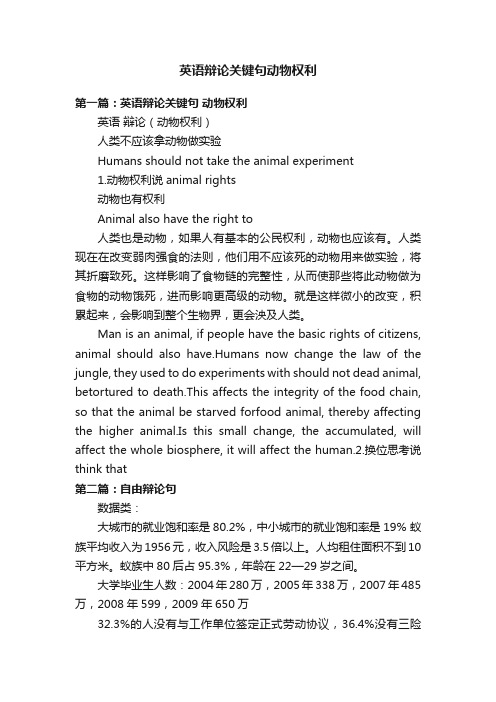
英语辩论关键句动物权利第一篇:英语辩论关键句动物权利英语辩论(动物权利)人类不应该拿动物做实验Humans should not take the animal experiment1.动物权利说animal rights动物也有权利Animal also have the right to人类也是动物,如果人有基本的公民权利,动物也应该有。
人类现在在改变弱肉强食的法则,他们用不应该死的动物用来做实验,将其折磨致死。
这样影响了食物链的完整性,从而使那些将此动物做为食物的动物饿死,进而影响更高级的动物。
就是这样微小的改变,积累起来,会影响到整个生物界,更会泱及人类。
Man is an animal, if people have the basic rights of citizens, animal should also have.Humans now change the law of the jungle, they used to do experiments with should not dead animal, betortured to death.This affects the integrity of the food chain, so that the animal be starved forfood animal, thereby affecting the higher animal.Is this small change, the accumulated, will affect the whole biosphere, it will affect the human.2.换位思考说think that第二篇:自由辩论句数据类:大城市的就业饱和率是80.2%,中小城市的就业饱和率是19% 蚁族平均收入为1956元,收入风险是3.5倍以上。
人均租住面积不到10平方米。
什么是动物权利?
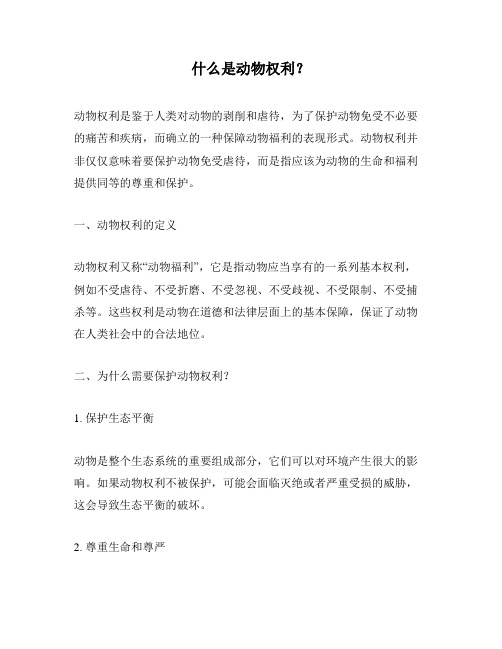
什么是动物权利?动物权利是鉴于人类对动物的剥削和虐待,为了保护动物免受不必要的痛苦和疾病,而确立的一种保障动物福利的表现形式。
动物权利并非仅仅意味着要保护动物免受虐待,而是指应该为动物的生命和福利提供同等的尊重和保护。
一、动物权利的定义动物权利又称“动物福利”,它是指动物应当享有的一系列基本权利,例如不受虐待、不受折磨、不受忽视、不受歧视、不受限制、不受捕杀等。
这些权利是动物在道德和法律层面上的基本保障,保证了动物在人类社会中的合法地位。
二、为什么需要保护动物权利?1. 保护生态平衡动物是整个生态系统的重要组成部分,它们可以对环境产生很大的影响。
如果动物权利不被保护,可能会面临灭绝或者严重受损的威胁,这会导致生态平衡的破坏。
2. 尊重生命和尊严生命和尊严是人类的基本价值观,同样也适用于动物。
人们应该尊重动物的生命和尊严,不应该通过任何方式来伤害和虐待它们。
3. 人类文明的进步随着人们对环境和生态的认识不断提高,越来越多的人已经开始关注保护动物权利的问题。
这不仅代表着人类文明的进步,也是社会发展的一个重要标志。
三、什么是动物福利法?动物福利法是为保护动物权益而颁布的法律规定,它为动物提供了保护和支持。
动物福利法规定了动物的基本权利和福利,同时也规定了对于违背动物福利法规定的行为,应该如何进行处罚和惩罚。
四、怎么保护动物权利?1. 支持动物保护组织动物保护组织是保护动物权利的重要力量,如果你认同这一理念,可以积极参与这些组织的活动并为它们提供支持。
2. 将动物权利教育作为一项重要任务人们应该逐步了解动物权利问题,特别是在教育中应该强调这一点。
只有当人们对动物权利有了深刻的了解,并且认同了这一理念,才能更好地保护动物权利。
3. 倡导素食主义生活方式为了保护动物,人们可以尝试拥抱素食主义生活方式,这代表着对动物生命权的尊重,也是一种对自然界和环境的保护。
五、总结动物权利问题的重要性不容忽视,只有当人们能够在生活中关注动物的权益,并积极参与到相关的保护行动中,才能让动物得到更好的保护。
动物保护与动物权利

动物保护与动物权利1. 动物保护概述动物保护是指人类对自然界的动植物资源进行保护、管理、利用和开发的一整套活动。
动物保护的实施旨在保护和促进各种动物及其栖息地的生存、繁衍和繁荣。
动物保护的范畴非常广泛,包括野生动物保护、家畜保护、饲养动物疾病防治和病害治疗、动物繁殖控制、动物卫生与环境保护等。
2. 动物权利概述动物权利是指各种动物的生存权、自由权、福利权以及免受虐待的权利。
动物权利的提倡者认为,人类不仅要认识到动物拥有基本的权利,还要承认人类对动物的利用和剥削是有限度的。
动物权利的核心是关注动物福利,认为人类应该尊重动物,关爱动物,并为动物创造一个更好的环境,以促进动物身心健康的发展。
3. 动物保护和动物权利之间的联系动物保护和动物权利密切联系在一起,动物保护的实施需要依据动物拥有基本权利这一前提条件,在动物保护的过程中也要尊重动物权利。
例如,野生动物保护中,保护区的设置和管理需要兼顾动物栖息区和动物福利;饲养动物疾病防治和病害治疗也需要保证饲养动物的免受疾病均等待遇,防止疾病扩散;动物繁殖和控制也需要兼顾动物福利和种苗的连续性等。
4. 中国动物保护和动物权利法律制度目前,中国的动物保护法律制度相对较为落后,但随着社会经济和文化的快速发展,人们越来越重视动物福利。
这也使得国家在制定一系列法律、法规和规章上的倡议和措施,以帮助保护动物,保障动物的权利和福利。
现已广为人知的动物保护法律法规有动物防疫法、野生动物保护法和动物福利法等。
其中,动物福利法在中国举步维艰,国家需要进一步完善和细化法律制度,鼓励和促进动物福利的有效实施。
5. 动物保护和动物权利的前景全球范围内,越来越多的人们开始关注和探讨动物保护和动物权利这一问题,这一现象意味着动物保护和动物权利的前景具有积极的发展潜力。
首先,越来越多的权威机构和团体正式或非正式地促进动物保护的普及和执行。
其次,国家政策和法规的完善和宣传推广。
最后,大量志愿者或团体的参与和支持,为动物保护和动物权利营造了更为宽松和有利的社会环境。
动物实验英语

动物实验英语
动物实验英语是指涉及到动物实验的相关英语词汇、术语及表达方式。
在科学研究中,动物实验是不可或缺的一部分,许多新药、新治疗手段或新技术的研发都需要通过动物实验来验证其安全性和有效性。
下面是一些常见的动物实验英语词汇和术语:
1. Animal testing –动物实验
2. Animal welfare –动物福利
3. Vivisection –活体解剖
4. Animal research –动物研究
5. In vivo testing –体内实验
6. In vitro testing –体外实验
7. Animal model –动物模型
8. Ethical considerations –道德考虑
9. Animal rights –动物权利
10. Experimental protocol –实验方案
11. Animal experimentation facility –动物实验设施
12. Animal care and use committee –动物保护和使用委员会
13. Pain and distress –痛苦和困扰
14. Anesthesia –麻醉
15. Euthanasia –安乐死
16. Animal welfare act –动物福利法案
对于动物实验的争议,人们有不同的观点和立场。
一些人认为,动物实验是必要的,可以带来许多医学上的进步和人类福祉;而另一些人则认为,动物实验是残忍和不道德的,应该尽可能避免使用动物进行实验。
因此,在进行动物实验时,科学家和研究人员需要严格遵守相关的法律法规和伦理要求,确保动物实验的合法性和道德性。
[英语作文]Animal rights动物权利
![[英语作文]Animal rights动物权利](https://img.taocdn.com/s3/m/99adbd38001ca300a6c30c22590102020740f2a1.png)
[英语作文]Animal rights动物权利Animal rights is a concept that recognizes animals as sentient beings with their own inherent value and interests, which should be respected and protected from human exploitation and abuse. It is an ethical and legal framework that advocates for the consideration of animals' well-being and opposes anthropocentrism—the idea that humans are the only species that matter.The animal rights movement has gained significant traction in recent decades, challenging traditional views on animal use and pushing for more compassionate treatment of non-human animals. This movement is grounded in the belief that animals are not merely resources or objects to be used for human benefit but rather individuals with their own needs and rights.One of the most prominent arguments for animal rights is based on the principle of sentience. Animals, like humans, are capable of experiencing pain, pleasure, fear, and joy. They have complex social structures, communication methods, and emotional lives. Therefore, the ability to suffer should grant them protection from cruelty and unnecessary harm.Another argument for animal rights is based on the principle of equality. Just as humans have basic rights such as the right to life, liberty, and freedom from torture, animals too should have these same rights. The notion that animals exist solely for human consumption or use is seen as morally arbitrary and discriminatory.In practice, animal rights can manifest in various ways, including legislation against animal cruelty, the promotion of vegetarianism or veganism as a moral choice, and opposition to industries that exploit animals such as factory farming, hunting, and animal testing. Many organizations and individuals work tirelessly to educate the public about the importance of animal welfare, advocating for changes in laws and societal attitudes towards animals.However, the animal rights movement also faces criticism and challenges. Some argue that humans have a moral duty to use animals for food, research, and other purposes that benefit society. Others point out the economic implications of widespread adoption of animal rights principles, particularly in industries that rely heavily on animal products.Despite these challenges, the animal rights movement continues to make progress. Laws and policies that protect animals from cruelty and abuse have been passed in many countries. More people are becoming aware of the ethical implications of their choices regarding animal products. Corporations arerecognizing the value of sustainable and ethical business practices that consider animal welfare.In conclusion, animal rights is a critical issue that touches on our moral obligation to treat all sentient beings with respect and dignity. As we strive to coexist with animals, it is essential that we acknowledge their rights, challenge exploitative practices, and work towards a more compassionate and harmonious world for all beings.。
保护动物权利英语作文
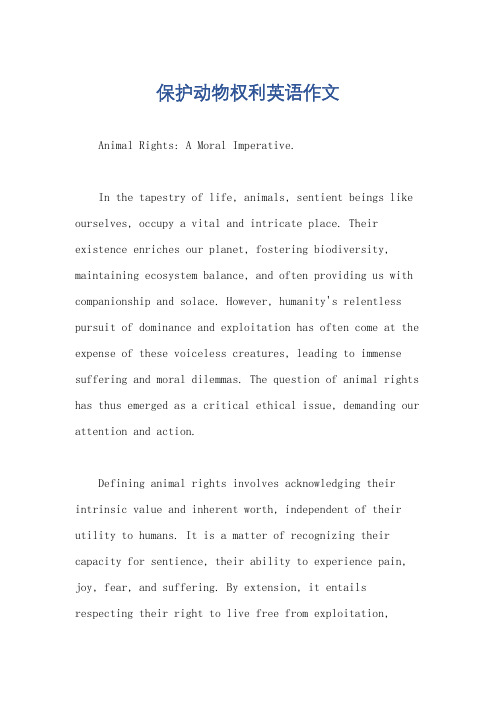
保护动物权利英语作文Animal Rights: A Moral Imperative.In the tapestry of life, animals, sentient beings like ourselves, occupy a vital and intricate place. Their existence enriches our planet, fostering biodiversity, maintaining ecosystem balance, and often providing us with companionship and solace. However, humanity's relentless pursuit of dominance and exploitation has often come at the expense of these voiceless creatures, leading to immense suffering and moral dilemmas. The question of animal rights has thus emerged as a critical ethical issue, demanding our attention and action.Defining animal rights involves acknowledging their intrinsic value and inherent worth, independent of their utility to humans. It is a matter of recognizing their capacity for sentience, their ability to experience pain, joy, fear, and suffering. By extension, it entails respecting their right to live free from exploitation,abuse, and needless harm.Protecting animal rights necessitates a multifaceted approach that encompasses both legal and ethical frameworks. Animal welfare laws, regulations, and policies play acrucial role in safeguarding their well-being. These laws often set minimum standards for animal care, transportation, and slaughter, albeit varying in their rigor and implementation across jurisdictions. While laws provide a baseline of protection, they can be limited in scope and enforcement.Ethical considerations, on the other hand, provide a broader moral compass. They guide our actions and decisions regarding animals, even in the absence of legal mandates. Ethical principles such as compassion, empathy, and non-violence should be integral to our interactions with animals. It is our moral duty to minimize their pain and suffering, provide them with adequate food, shelter, and veterinary care, and respect their inherent dignity.The ethical arguments for animal rights are compelling.Animals are sentient beings capable of experiencing a wide range of emotions and sensations. They have complex social structures, exhibit cognitive abilities, and form strong bonds with their kin and companions. The infliction of unnecessary pain or distress upon them violates their inherent worth and is morally unjustifiable.Furthermore, the concept of animal rights is inextricably linked to our own humanity. By extending compassion and respect to animals, we affirm the value of all life, including our own. It is a reflection of our moral maturity and an acknowledgment of our place as part of a larger web of existence.The protection of animal rights extends beyond individual acts of kindness or compliance with laws. It requires systemic changes in our societies and economies. The industrialization of animal agriculture, with its intensive farming practices and cruel factory farming, poses a grave threat to the well-being of billions of animals. Consumer choices and dietary habits play a significant role in shaping the demand for animal products,and we have a moral obligation to consider the implications of our choices on animal welfare.Recognizing and protecting animal rights also involves addressing the issue of animal experimentation. While animal research has undoubtedly contributed to medical advancements, there is a growing ethical concern over the use of animals in invasive and painful experiments. The development of alternative non-animal research methods should be prioritized to reduce the reliance on animal testing and minimize their suffering.It is worth noting that the animal rights movement is not about denying human rights or downplaying the value of human life. Rather, it seeks to expand the circle of compassion and ethical consideration to encompass all sentient beings. Recognizing the inherent worth of animals does not diminish our own; it enhances our understanding of the interconnectedness of all life and the moralobligations that come with it.The protection of animal rights is not merely anabstract philosophical concept but a fundamental moral imperative. It is a matter of justice for the voiceless, a recognition of their inherent value, and a reflection of our own humanity. By embracing animal rights, we create a more just, compassionate, and sustainable world for all.。
什么是动物权利?
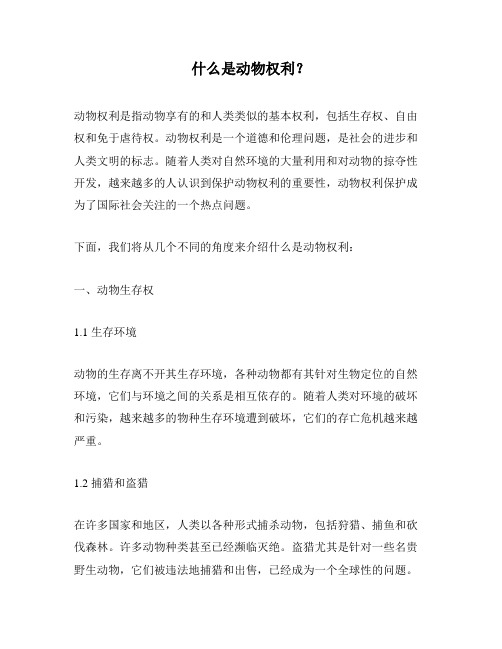
什么是动物权利?动物权利是指动物享有的和人类类似的基本权利,包括生存权、自由权和免于虐待权。
动物权利是一个道德和伦理问题,是社会的进步和人类文明的标志。
随着人类对自然环境的大量利用和对动物的掠夺性开发,越来越多的人认识到保护动物权利的重要性,动物权利保护成为了国际社会关注的一个热点问题。
下面,我们将从几个不同的角度来介绍什么是动物权利:一、动物生存权1.1 生存环境动物的生存离不开其生存环境,各种动物都有其针对生物定位的自然环境,它们与环境之间的关系是相互依存的。
随着人类对环境的破坏和污染,越来越多的物种生存环境遭到破坏,它们的存亡危机越来越严重。
1.2 捕猎和盗猎在许多国家和地区,人类以各种形式捕杀动物,包括狩猎、捕鱼和砍伐森林。
许多动物种类甚至已经濒临灭绝。
盗猎尤其是针对一些名贵野生动物,它们被违法地捕猎和出售,已经成为一个全球性的问题。
1.3 资源开采许多动物的生存环境在资源开采中遭到了影响,包括水库的建设、油气开采、采矿等等。
经常是,物种和它们的栖息地被迫迁移和改变,不会适应这一变化,最终导致它们濒临绝灭。
二、动物自由权2.1自由的生存环境与上面的环境问题有关,自由权包括动物在其自然生活环境中的自由、在没有外来干扰下,可以随意进出自己的自然栖息地。
自由的动物可以找到足够的食物、水源和安全的巢穴。
2.2 遭受虐待在家庭、商业或娱乐活动中,动物们有时会被迫做一些不自然的事情,例如,被跑马场、驾驶范围或动物园、马戏表演等活动迫使他们做出某些行为。
这种行为可能会对动物健康和生活产生负面影响。
2.3实验室实验常常在医学、化学和生物科学领域进行的实验中,动物被用作测试适应性和安全性。
说实话,这种实验不能被完全替代,但是我们应该采用更多关注动物的实验方法来确保它们的权利和保护。
三、动物不受虐待的权利3.1残酷的对待许多动物遭受虐待,例如爆打、拳打、踢打、剥牙、剪耳朵、摔打等等。
在许多国家,在动物结构中使用电击杆和器械将动物推向极限。
兽医学英语词汇【参考】

一、兽医学基本词汇1. Anatomy(解剖学)skeleton(骨骼)muscle(肌肉)organ(器官)tissue(组织)2. Physiology(生理学)circulation(循环)digestion(消化)respiration(呼吸)reproduction(生殖)3. Pathology(病理学)disease(疾病)infection(感染)inflammation(炎症)tumor(肿瘤)4. Pharmacology(药理学)drug(药物)dosage(剂量)medication(药物治疗)vaccination(疫苗接种)5. Surgery(外科学)operation(手术)anesthesia(麻醉)suture(缝合)wound(伤口)二、兽医学专业词汇1. Canine(犬科)dog(犬)puppy(幼犬)rabies(狂犬病)distemper(犬瘟热)2. Feline(猫科)cat(猫)kitten(幼猫)feline leukemia(猫白血病)panleukopenia(猫细小病毒病)3. Equine(马科)horse(马)colt(幼马)laminitis(蹄叶炎)equine influenza(马流感)4. Bovine(牛科)cow(牛)calf(牛犊)mastitis(乳腺炎)bovine tuberculosis(牛结核病)5. Porcine(猪科)pig(猪)porker(小猪)swine fever(猪瘟)porcine reproductive and respiratory syndrome(猪繁殖与呼吸综合征)三、兽医学诊断与治疗词汇1. Diagnostic Procedures(诊断程序)clinical examination(临床检查)laboratory tests(实验室检测)radiography(X光检查)ultrasound(超声波检查)2. Therapeutic Terms(治疗术语)therapy(治疗)chemotherapy(化疗)immunotherapy(免疫治疗)rehabilitation(康复)3. Clinical Signs(临床体征)symptom(症状)sign(体征)diagnostic marker(诊断标志)abnormality(异常)四、兽医学管理与预防词汇1. Animal Husbandry(动物饲养)breeding(繁殖)nutrition(营养)housing(饲养环境)welfare(福利)2. Preventive Medicine(预防医学)vaccination(疫苗接种)deworming(驱虫)biosecurity(生物安全)zoonosis(人畜共患病)3. Veterinary Ethics(兽医伦理)animal rights(动物权利)humane treatment(人道对待)euthanasia(安乐死)professional conduct(职业行为)五、兽医学研究与学术交流词汇1. Research Methods(研究方法)experiment(实验)study design(研究设计)statistical analysis(统计分析)case report(病例报告)2. Academic Communication(学术交流) conference(会议)symposium(研讨会)publication(出版物)peer review(同行评审)六、兽医学专业分支特定词汇1. Veterinary Dermatology(兽医皮肤病学)dermatitis(皮炎)mange(疥疮)allergic reaction(过敏反应)alopecia(脱发)2. Veterinary Cardiology(兽医心脏病学)arrhythmia(心律不齐)heart murmur(心脏杂音)congestive heart failure(充血性心力衰竭) valvular disease(瓣膜病)3. Veterinary Oncology(兽医肿瘤学)carcinoma(癌)benign tumor(良性肿瘤)malignant tumor(恶性肿瘤)七、兽医学法律法规与标准词汇1. Legal Terms(法律术语)veterinary legislation(兽医立法)animal welfare act(动物福利法)license(执业许可证)regulations(规章)2. Standards and Protocols(标准与协议)standard operating procedure(标准操作程序)protocol(协议)guidelines(指南)certification(认证)八、兽医学教育与职业发展词汇1. Veterinary Education(兽医学教育)veterinary college(兽医学院)curriculum(课程)clinical rotation(临床轮转)residency(住院医师培训)2. Professional Development(职业发展) continuing education(继续教育)board certification(专业认证)specialty(专业领域)mentorship(导师制)九、兽医学技术创新与设备词汇1. Technological Innovations(技术创新) telemedicine(远程医疗)digital radiography(数字X光)laser therapy(激光治疗)regenerative medicine(再生医学)2. Veterinary Equipment(兽医设备)microscope(显微镜)endoscope(内窥镜)autoclave(高压灭菌器)surgical suite(手术室)十、兽医学环境与生态词汇1. Environmental Impact(环境影响)ecosystem(生态系统)biodiversity(生物多样性)conservation(保护)sustainable practices(可持续实践)2. Wildlife Health(野生动物健康)wildlife rehabilitation(野生动物康复) habitat(栖息地)migration(迁徙)zoonotic disease(人畜共患病)。
动物权利运动 Animal rights movement(英文)

What really is an animal rights movement?Animal rights movement, also called animal liberation movement is a social movement, seeking an end to animals being treated as human beings’ possessions and their use in the research, food, clothing, and entertainment industries. Its purpose not only advocates that animals have rights to be treated mercifully, but also advocates that animals should have certain basic right like human beings. Animals should not be treated as human property or tools, both at the legal level or spiritual level.In some countries, legislation has been enacted to protect animal rights. In 1992, Switzerland legally confirmed that animals were "beings" rather than "items". In 2002, Germany incorporated animal protection provisions into the constitution. Animal rights movement has started placing its influences on political decision making in some countries. The trend continues to increase.Critics argue that, since animals make no moral judgments of social contracts, they cannot be responsible for the rights of others or even have no concept of rights at all, therefore cannot be considered having a spirit. Only human beings have the sense of responsibility, so only they should have rights.Some animal rights advocates argue that, although fundamentally, there is nothing wrong with the use of animals for food, entertainment, or scientific research, people should legislate to protect animals from unnecessary suffering. This view is called animal welfare and is also the view of some veteran animal protection organizations. The liberationist views of animal rights believe animals should have a certain spiritual right. The basic rights of animals should be protected by laws. It is different from the view of animal welfare that just care about animals for not being abused and not trying to protect the animal's spiritual rights.Animal rights activists believe that animal experiments will make animal illness oreven death, and there are many kinds of alternatives. The animal experiments are only for human own interests at the expense of animal right to life.In animal rights movement, activists are often involved in boycotting these cruel treatments upon animal in farmland and slaughter house and live animal exports. Boycotting against companies which have been subjected to a number of animal experiments during product development is also common. They are strongly opposed to the apparent damage to animal rights, including fur trading, hunting, circus, equestrian competition, zoo and pet sale. More and more animal rights activists are engaged in direct fighting, such as rescuing animals from laboratories which occasionally raises violent clashes. There is also an increased "public rescue" behavior.In addition, Animal rightists are also committed to educating the public via various media. Many animal activists pursue vegetarianism and advocate eating less meat. They believe that since the general human beings have always considered themselves high creatures, then they should not make animal predation behavior. Humans are omnivorous and able to choose to eat vegetables.Critics argue that the concept of animal rights movement involves the moral judgment of philosophy, which is to turn mankind into a second-class citizen below the animal. Some critics even believe that animal rights movement is anti-human activities.。
第3讲 动物权利论

所有的生命主体都有内 在价值。动物是生命主 体,所以有内在价值。
曾经以为动物不会使用工具 大猩猩用手杖涉水
海豚利用海绵捕食
海豚利用海绵捕食
灵巧的乌鸦
道德执行者(moral agents)与道德顾 客( moral patients) 人类共同体中的婴儿、儿童、智障者、 严重残疾人都不能履行道德义务,但 享受道德的保护,即有道德资格,他 们不能主动地、道德地行事,但应被 道德地对待。
过严的生命主体标准 环境主义者指责里根的生命主体标准太 严格,许多生命被排除在外。
个体主义的错误 在人类共同体中也并非个人才拥有 权利,公司、民族都拥有权利,而且公 司、民族的权利不可还原为个人权利。 个体主义思想与生态学相矛盾,在 里根看来,人类对地球上最后一只大熊 猫的道德责任也并不比对一头猪的道德 责任重。它们都应该受到同等的尊重。 但生态学不认为这样。
第三讲 动 物 权 利 论
动物显然是跟人类最相像的非人存在 者,跟人类的关系最为“亲密”。很 多城市人在感情上依赖于宠物。
若干案例:
案例1:
某年某著名大学的一名学生用食物包裹硫 酸喂动物园的狗熊,对狗熊造成严重身体 伤害,受到舆论强烈谴责。
案例2: 活熊取胆 活熊取胆是给熊做一个终生手术。这个 手术是将一个金属管永久地插入熊的胆囊里, 另一端露在熊的腹部外面,取胆时与一个长 长的皮管连接,胆汁就经由这个皮管流入一 个铁管内。有时为了增加胆汁的流出量,熊 场干脆用特制的针管抽取胆汁。每到这个时 候,被抽取胆汁的熊都会疼得不住地惨嚎, 同时他们还不停地抓挠腹部的铁管,有时会 把自己的腹部抓得血肉模糊。
动物也是如此,它们不是道德执行者,而是 道德顾客,有道德资格。所有的生活主体都 有一些不可剥夺的权利,最基本的权利是生 命权、身体完整权和活动自由(与其他生活 主体的活动自由不相冲突)。动物也有这些 权利。这是正义原则的要求。
动物与人类平等的英文单词

动物与人类平等的英文单词English:The concept of equality between animals and humans is often referred to as "animal rights". This approach emphasizes the idea that animals deserve the same consideration and respect as humans, and that they should not be exploited or oppressed for the benefit of humans. It advocates for the protection of animals from cruelty and mistreatment, and promotes the idea that they have their own inherent value and rights. This includes the right to live free from harm and suffering, and to not be used for entertainment, experimentation, or other human purposes without their consent. Animal rights also encompass the belief that animals should not be viewed as property, but rather as individual beings with their own interests and needs that should be taken into account in both legal and ethical frameworks.中文翻译:动物与人类平等的概念通常被称为“动物权利”。
雅思写作中关于环境保护的词汇词组

雅思写作中关于环境保护的词汇词组下面是我搜集的雅思写作中关于环境保护的词汇词组:1.vivisection活体解剖2.perform. experiments on animals在动物身上做试验3.test animals用于实验的动物4.be subjected to experiments被迫接受试验5.animal rights动物权利6.clinical research临床研究7.cruel残忍的8.extremist极端主义者9.medical research医学研究10. origin of species物种起源11. alternative method替代的方法12. biological diversity生物多样性13. natural balance自然平衡14. equilibrium of ecosystem生态平衡15. coexistence共存16. endangered animals濒危动物17. diversity of species物种多样性18. shameless令人羞愧的19. barbaric野蛮的20. live and let live活着就是与万物共存21. meaningless没有意义的22. dominant species优势物种23. laboratory实验室24. vaccine疫苗25. infringement践踏26. right to live生存权27. torture折磨28. anti-science反科学的29. life-threatening diseases危及生命的疾病30. scientific gains科学成果31. an ever-lasting theme一个永恒的主题32. evolution进化33. computer simulation电脑模拟34. groundless没有理由的35. humane人道的36. medical technology医疗技术37. anatomy解剖38. equal公平的39. unreliable不可信赖的40.valid有效的、正当的her in a brand-new lifestyle.带来一种崭新的生活方式42.enrich people’s spiritual life丰富了人们的精神生活43. Lead to the extinction of some species导致了一些物种的灭绝44. penetrate every corner of our life and be impressive渗透到了生活的方方面面并且给我们留下了深刻的印象45. protection of wild animals野生动物保护46. provide habitats for a huge number of wild animals and plants给野生动植物提供栖息地47.1make an important step迈出重要一步48. Endangered animals 濒危动物49. Diversity of species物种多样性50. advocate civilized lifestyle.倡导文明的生活方式51. intensified competition激烈的竞争52. be based on基于53. Set (present) a bad example to给某人树立了坏的榜样54. Be a root of all evil是万恶之源55. maintain a natural balance维护了自然平衡56. meet the demands of people迎合和满足了人们的需求57. Account for解释或者占到58. protect and improve the living environment and the ecological environment 保护和促进生存环境和生态环境59. seize opportunities抓住机遇60. devote oneself to投身于…61. be dedicated to致力于…62.mirror human civilization体现人类文明63. share views similar to与…持有相同的观点64. help each other forward携手共进65. have cooperative ties with与…有合作关系66. be a direct result of是…的直接结果67.have no apparent connection to与…没有显著关系68. deserve to be mentioned值得一提69.pattern of life生活方式70. to one’s heart’s content称心如意71. filled with confidence and strength充满信心和力量72. create the course of开创了…的历程73. enter a new period进入新时期74.have a far-reaching impact on对…产生了深远的影响75. pursue progress追求进步76. look forward to the bright future展望未来77.be accustomed to习惯于78. give full play to…充分发挥79.emotional comfort情感慰藉80.rely on…依赖…。
英语口语 动物权利
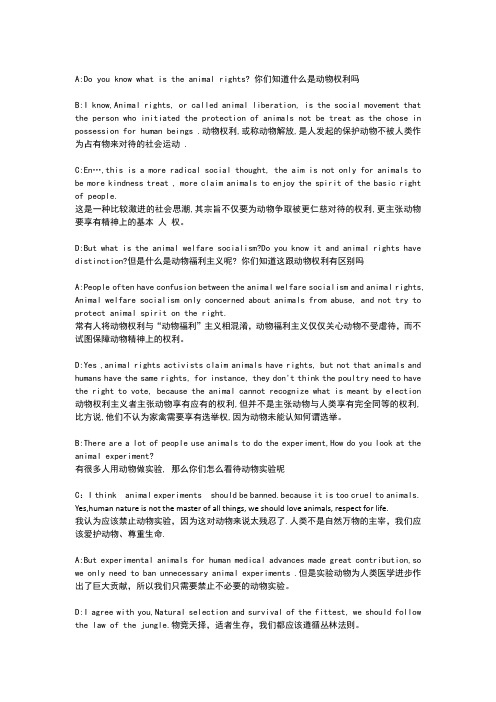
A:Do you know what is the animal rights? 你们知道什么是动物权利吗B:I know,Animal rights, or called animal liberation, is the social movement that the person who initiated the protection of animals not be treat as the chose in possession for human beings .动物权利,或称动物解放,是人发起的保护动物不被人类作为占有物来对待的社会运动 .C:En…,this is a more radical social thought, the aim is not only for animals to be more kindness treat , more claim animals to enjoy the spirit of the basic right of people.这是一种比较激进的社会思潮,其宗旨不仅要为动物争取被更仁慈对待的权利,更主张动物要享有精神上的基本人权。
D:But what is the animal welfare socialism?Do you know it and animal rights have distinction?但是什么是动物福利主义呢? 你们知道这跟动物权利有区别吗A:People often have confusion between the animal welfare socialism and animal rights, Animal welfare socialism only concerned about animals from abuse, and not try to protect animal spirit on the right.常有人将动物权利与“动物福利”主义相混淆,动物福利主义仅仅关心动物不受虐待,而不试图保障动物精神上的权利。
animal rights pros 动物权利 支持意见
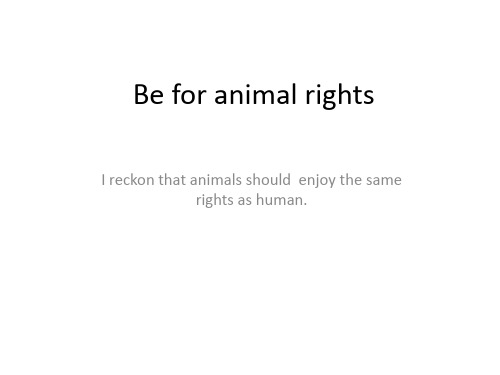
They have some good moral characters that also are possessed by people. Human are just high-ranking animals. In the past millions of years, we live together. We should keep to get along with animals harmoniously
Brotherhood
Love
Interdependence
Treating animals bloodily is inhumane. We advertise the truth goodness and beauty, and we should give them the rights. They have done nothing wrong, and they are only in accordance with the laws of nature to live in peace. Each species has its biological meaning of the existence, and they only follow the natural law of survival.
Animals are our friends. We enjoy the fresh air, the clearn water, the beautiful environment together. We share one sky, one earth and one world, just like a family.
Be for animal rights
动物权利,英语animals' rights

electrocution poisoning Brain operation fishing persecution poach horse sports
pet stores …. circuses slavery
dog race Trophäen sammeln hunting
Sports
Entertainment
ANIMAL RIGHTS
The following things you must have done.
Eat steak
watch the circus on TV
Kill mosquitoes
See butterfly specimen on sale
So what do you think of these things? Right or wrong?
Angered man stabbed his dog.
This dog suffers from severe malnutrition.
Clorox testing
Cosmetics testing
Unknown cleaning chemicals testing
Scientists are now using animals for experiences that will bring out new drugs.
If they are right , that means we can continue to do what we are doing now….. If they are wrong, then does it mean that we should be vegetarians?
castration without anaesthesia vivisection overdose gluttony Contergan slaughtering
动物的权利 Animal Right 英语作文

Animal RightIt is the idea that all animals are born free like humans, and we should not subject them to exploitation for our needs. Animal rights aim to give animals the same rights as humans in which they are not killed or tortured at the hands of people.Animal Rights Essay: Animal Rights is the thought or idea that says that some or all animals are entitled to their basic rights such as possession of their life, and other crucial needs to survive.It is the idea that all animals are born free like humans, and we should not subject them to exploitation for our needs. Animal rights aim to give animals the same rights as humans in which they are not killed or tortured at the hands of people.Long and Short Essays on Animal Right for Students and Kids in EnglishWe provide children and students with essay samples on an extended essay of 500 words and a short piece of 150 words on the topic “Animal Rights” for reference.Long Essay on Animal Rights 500 Words in EnglishIs it unjust to kill animals to feed ourselves? If you are a vegetarian or an animal lover, you might find killing animals to feed ourselves as unethical. There are various views on the subject, and continuous debates and articles try to resolve the matter.Animal rights are the thought process that all animals have basic rights like all human beings, and they do not deserve to be killed at our hands or made to suffer. It is best not to viewanimals as our commodities. It is wrong to view them as our resources. If we can accept the fact that animals are not born to be killed or exploited at our hands, we can approach a human view of treating animals and can then genuinely discuss the rights of animals.We wrongly believe that animals are the commodities that we use. If we adopt this thought, our actions towards them will be unethical and regrettable. If we think that animals have no moral status, we will be extremely apathetic, which is diametric to human nature. The wrong thought process can hamper the understanding and reasoning of everything in our life.Animals are living creatures, and so are we. They too feel pain and suffering. Hence, it is not illogical to consider the topic of animals having rights.Believing that animals have rights does not necessarily mean that eating meat is wrong or unethical. People of different backgrounds and religions follow different diets and have different eating habits. Some of them include non-vegetarian diets, and some of them don’t.Eating meat is a lifestyle for some people, and others should respect it. But, eating meat is not the only question that comes to mind when we think about animal rights. Thousands of animals are kept in farms and slaughterhouses. They are brought up in extremely inhospitable environments and are ultimately killed. Many of them are brought and stored in labs, and people perform all sorts of heinous and inexplicable experiments on them.You can now access more Essay Writing on this topic and many more.Humans torture millions of animals every year in labs. They burn, cut or starve animals in the name of research that does not always bear results. Most drugs that work on animals might not work for humans or not have the same efficiency. Hence, it is barbaric to meaninglessly kill animals and think that they do not have any rights.People should never believe that animals are useless, dumb creatures. They too have a soul and can feel. Their emotions might not be as complex as humans, but they deserve to be acknowledged.Humans are different than other animals. We have a moral compass and try to justify the events around us. Hence, when we think about any living creature being hurt, it makes us sad.If you see an abused animal or an injured animal, you could walk past it. You could alsoreport the animal abuse if it is a domestic animal, or take it to the vet for treatment. We should have realized that it is more peaceful to care for animals contently, than kill or capture them. Animals are soulful creatures like us and magnificent creation. We should respect them, and they do have rights.Short Essay on Animal Rights 150 Words in EnglishShort Essay on Animal Rights is usually given to classes 1, 2, 3, 4, 5, and 6.The animal right is the thought that all animals have birthrights like humans. It is the liberal thought process where we consider all animals to have basic rights that would protect them from being subjected to torture, starvation, slaughtering, etc. for our benefits.There are a lot of disagreements regarding animals having rights. Some people argue that animal rights should be protected, while others argue that there is no need for animal rights.People who say that animals have no rights, think it to be true because they view animals as commodities that we can exploit whenever required. Some people think that animals are created for our pleasure and our needs since we are at the top of the food chain. These people are largely mistaken.All animals have souls and are living beings just like us. They have sensations and can feel everything around them just like humans can. Hence, we are morally obliged to acknowledge the rights of animals and not harvest them.10 Lines on Animal Rights Essay in English1. Animal rights are the concept that animals have similar rights as human.2. Many people support animal rights, and many p eople don’t.3. Many believe that animal rights should be established to protect the basic needs of all animals.4. Others believe that animals don’t require any rights, and are present to satisfy the needs of humans.5. It is a wrong thought that animals are commodities for humans, and can be used as objects.6. Animals are projected to cruel treatments in places like animal farms, animal testing labs, etc.7. The animal rights issue is a hotly debated topic.8. All animals are living organisms and can feel like us. Hence, we should treat them as such.9. Humans are superior to other animals in terms of evolutions, but we belong to theanimal kingdom as well.10. Humans have morals, unlike other animals. We should use it to support the cause of animal rights.FAQ’s on Animal Rights EssayQuestion 1.What are animal rights?Answer:Animal right is the idea that animals deserve similar rights like a human. People who are supporters of animal rights believe that all animals have fundamental rights, such as the right to live and not tortured.Question 2.What is animal testing?Answer:Animal testing is the method of using animalsas test-subjects for testing drugs and products on animals.Question 3.Why is animal right relevant?Answer:We use animals as a commodity and use them as we will. As human beings who have morals, we can think about considering the rights of animals too.Question 4.Why should we give rights to animals?Answer:Like human beings, animals also are living being who can feel what goes on around them. Hence, animals should have the basic right to survive.。
动物权益给予动物公平待遇与尊重

行为。
推动科技进步,减少实验动物痛苦
推广替代实验方法
鼓励科研机构和企业采用非动物实验方法,如体外实验和计算机 模拟等。
减少实验动物数量
优化实验设计,提高实验效率,减少不必要的实验动物使用。
改善实验动物福利
为实验动物提供适宜的饲养环境和医疗照顾,减少实验过程中的 痛苦和不适。
06
总结与展望
当前动物权益保护取得的成就
THANKS
感谢观看
为动物提供舒适、安全、 卫生的生活环境,避免恶 劣环境对动物造成不良影 响。
适宜的温度和湿度
确保动物生活环境的温度 和湿度适宜,避免极端温 度或湿度对动物造成不适 或伤害。
必要的庇护所
为动物提供必要的庇护所 ,以保护其免受恶劣天气 、自然灾害等不可控因素 的影响。
关注动物心理健康
社交需求
满足动物的社交需求,允许其与 同类或其他动物进行适当的交流
合理饲养与管理
01
02
03
充足的食物和水源
确保动物获得足够的食物 和水,以满足其基本生存 需求。
适当的饲养空间
为动物提供足够的活动空 间,避免过度拥挤和限制 动物自由。
合适的饲养方式
根据动物的种类和习性, 采用适当的饲养方式,避 免对动物造成不必要的痛 苦和伤害。
提供适宜的生活环境
舒适的生活环境
化妆品实验
一些化妆品公司在研发新产品时,也会使用动物进行实验,这些实验同样会给动物带来 痛苦。
原因分析:法律缺失、道德沦丧等
法律缺失
许多国家缺乏完善的动物保护法 律,导致动物权益受到侵害时无
法得到有效的法律保障。
道德沦丧
一些人缺乏基本的道德观念,对 动物的痛苦和生命漠不关心,甚
动物权利历史
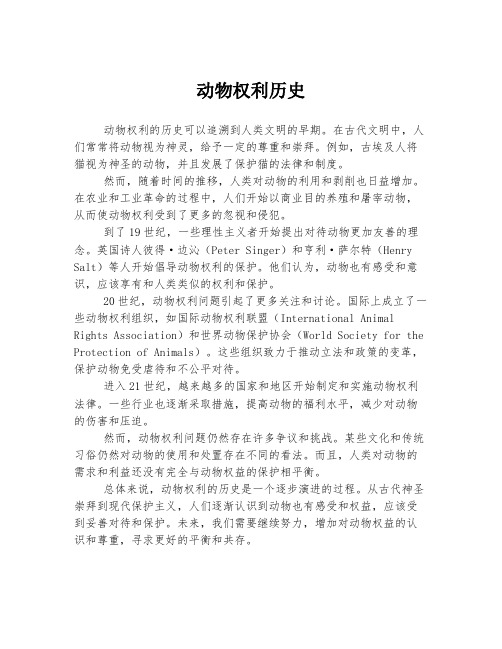
动物权利历史动物权利的历史可以追溯到人类文明的早期。
在古代文明中,人们常常将动物视为神灵,给予一定的尊重和崇拜。
例如,古埃及人将猫视为神圣的动物,并且发展了保护猫的法律和制度。
然而,随着时间的推移,人类对动物的利用和剥削也日益增加。
在农业和工业革命的过程中,人们开始以商业目的养殖和屠宰动物,从而使动物权利受到了更多的忽视和侵犯。
到了19世纪,一些理性主义者开始提出对待动物更加友善的理念。
英国诗人彼得·边沁(Peter Singer)和亨利·萨尔特(Henry Salt)等人开始倡导动物权利的保护。
他们认为,动物也有感受和意识,应该享有和人类类似的权利和保护。
20世纪,动物权利问题引起了更多关注和讨论。
国际上成立了一些动物权利组织,如国际动物权利联盟(International Animal Rights Association)和世界动物保护协会(World Society for the Protection of Animals)。
这些组织致力于推动立法和政策的变革,保护动物免受虐待和不公平对待。
进入21世纪,越来越多的国家和地区开始制定和实施动物权利法律。
一些行业也逐渐采取措施,提高动物的福利水平,减少对动物的伤害和压迫。
然而,动物权利问题仍然存在许多争议和挑战。
某些文化和传统习俗仍然对动物的使用和处置存在不同的看法。
而且,人类对动物的需求和利益还没有完全与动物权益的保护相平衡。
总体来说,动物权利的历史是一个逐步演进的过程。
从古代神圣崇拜到现代保护主义,人们逐渐认识到动物也有感受和权益,应该受到妥善对待和保护。
未来,我们需要继续努力,增加对动物权益的认识和尊重,寻求更好的平衡和共存。
环境保护的高考英语单词
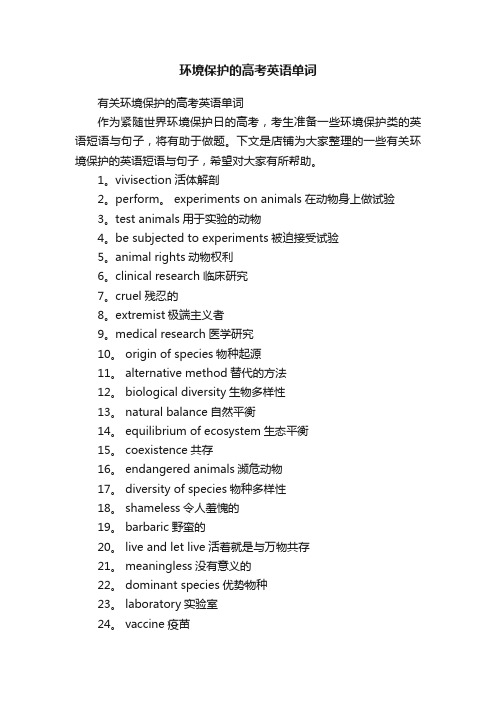
环境保护的高考英语单词有关环境保护的高考英语单词作为紧随世界环境保护日的高考,考生准备一些环境保护类的英语短语与句子,将有助于做题。
下文是店铺为大家整理的一些有关环境保护的英语短语与句子,希望对大家有所帮助。
1。
vivisection活体解剖2。
perform。
experiments on animals在动物身上做试验3。
test animals用于实验的动物4。
be subjected to experiments被迫接受试验5。
animal rights动物权利6。
clinical research临床研究7。
cruel残忍的8。
extremist极端主义者9。
medical research医学研究10。
origin of species物种起源11。
alternative method替代的方法12。
biological diversity生物多样性13。
natural balance自然平衡14。
equilibrium of ecosystem生态平衡15。
coexistence共存16。
endangered animals濒危动物17。
diversity of species物种多样性18。
shameless令人羞愧的19。
barbaric野蛮的20。
live and let live活着就是与万物共存21。
meaningless没有意义的22。
dominant species优势物种23。
laboratory实验室24。
vaccine疫苗25。
infringement践踏26。
right to live生存权27。
torture折磨28。
anti-science反科学的29。
life-threatening diseases危及生命的疾病30。
scientific gains科学成果31。
an ever-lasting theme一个永恒的主题32。
- 1、下载文档前请自行甄别文档内容的完整性,平台不提供额外的编辑、内容补充、找答案等附加服务。
- 2、"仅部分预览"的文档,不可在线预览部分如存在完整性等问题,可反馈申请退款(可完整预览的文档不适用该条件!)。
- 3、如文档侵犯您的权益,请联系客服反馈,我们会尽快为您处理(人工客服工作时间:9:00-18:30)。
.Vivisection
• .Vivisection is the practice of animal experimentation. This can include administering drugs, infecting with diseases, poisoning for toxicity testing, brain damaging, maiming, blinding, and other painful and invasive procedures. It can include protocols that cause severe suffering, such as long-term social isolation, full-body restraint, electric shocks, withholding of food and water, or repeatedly breeding and separating infants from mothers.
Mens rea
• .Mens rea is Latin for "guilty mind". In criminal law, it is viewed as one of the necessary elements of a crime. The standard common law test of criminal liability is usually expressed in the Latin phrase, actus non facit reum nisi mens sit rea, which means "the act does not make a person guilty unless the mind is also guilty". Thus, in jurisdictions with due process, there must be an actus reus accompanied by some level of mens rea to constitute the crime with which the defendant is charged (see the technical requirement of concurrence). As a general rule, criminal liability does not attach to a person who acted with the absence of mental fault. The exception is strict liability crimes.
ห้องสมุดไป่ตู้
Animal rights
• .Animal rights is the idea that some or all nonhuman animals are entitled to the possession of their own lives, and that their most basic interests – such as an interest in not suffering – should be afforded the same consideration as the similar interests of human beings.
Utilitarianism
Informed consent
• Informed consent refers to the permission given by a person before surgery or other kinds of medical treatments. The patient, or a parent/guardian, must understand the potential risks and benefits of the treatment and legally agree to accept those risks in writing. Furthermore, the risks and possible side effects must be explained in easy-to-understand language that the patient can understand.
.Animal testing
• .Animal testing is a phrase that most people have heard but are perhaps still unsure of exactly what is involved. Whether it is called animal testing, animal experimentation or animal research, it refers to the experimentation carried out on animals. It is used to assess the safety and effectiveness of everything from medication to cosmetics, as well as understanding how the human body works. While supporters believe it is a necessary practice, those opposed to animal testing believe that it involves the torture and Suffering Of Animals.
ANIMAL
RIGHTS
-----by group 2(FU ZHEN, LAI NING ,WANG SHENGZHE ,YUAN WEICHEN,ZHONG YUAN)
SPECIESISM
• Speciesism is a term coined by Richard Ryder in 1970. The word refers to the widely held belief that the human species is inherently superior to other species and so has rights or privileges that are denied to other sentient animals. (See Painism). ‘Speciesism’ can also be used to describe the oppressive behaviour, cruelty, prejudice and discrimination that are associated with such a belief. In a more restricted sense, speciesism can refer to such beliefs and behaviours if they are based upon the species-difference alone, as if such a difference is, in itself, a justification.
Actus reus
• Actus reus is a Latin term, which means "the guilty act." Actus reus, by definition, means that there must be an action or physical movement. In other words, it is the overt physical action that makes a person liable for a crime. Actus reus is always required in the United States for the commission of a crime, since a person cannot be found guilty of thinking criminal thoughts, or wishing that a crime would take place.
Veganism
• Veganism is a small but growing movement. In many countries the number of vegan restaurants is increasing, and some of the top athletes in certain endurance sportsfor instance, the Ironman triathlon and the ultramarathon—practise veganism, including raw veganism. Well-planned vegan diets have been found to offer protection against many degenerative conditions, including heart disease, and are regarded by the American Dietetic Association and Dietitians of Canada as appropriate for all stages of the life-cycle.
Animal rights movement
• The animal rights movement, sometimes called the animal liberation movement, animal personhood, or animal advocacy movement, is a social movement which seeks an end to the rigid moral and legal distinction drawn between human and non-human animals, an end to the status of animals as property, and an end to their use in the research, food, clothing, and entertainment industries.
